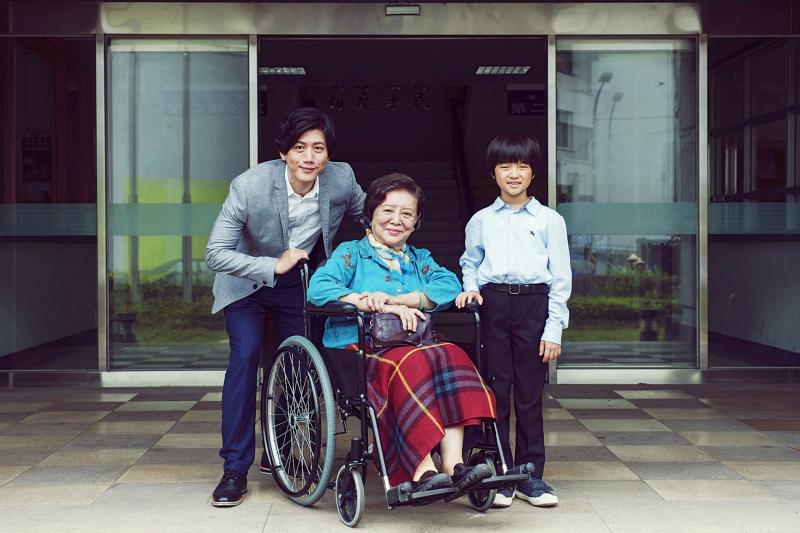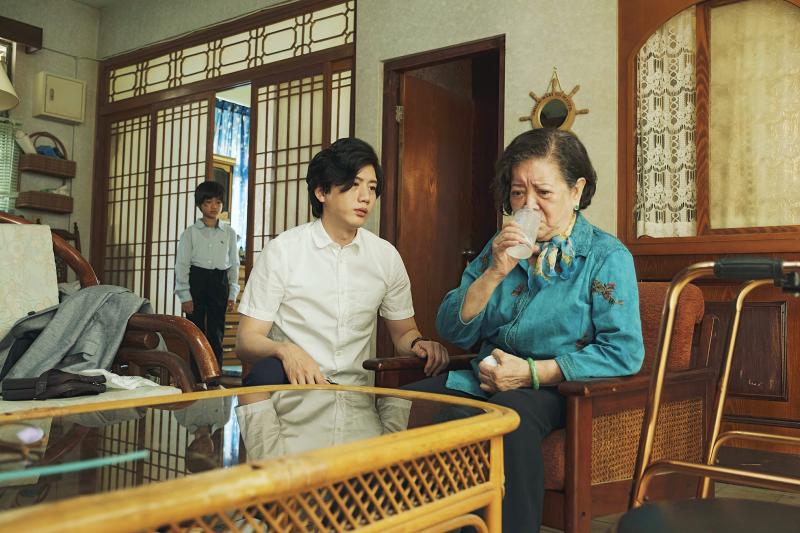It seems like slow-burning, suffocating family dramas of despair, sorrow and redemption are in fashion in Taiwanese cinema these days. It worked with films like last year’s Golden Horse darling A Sun (陽光普照) and July’s Wild Sparrow (野雀之詩), but not every production warrants this treatment.
It’s not that Dear Tenant (親愛的房客) isn’t deserving of its six Golden Horse nominations. The story of a gay man selflessly caring for his dead lover’s elderly mother and young son tenderly explores the limits of unconditional love and the judgment and misunderstanding society still exhibits towards homosexuality — and from a man who isn’t directly related to the family.
“If I were a woman, and my husband died but I stayed with his family to care for them, would you be asking the same questions?” Chien-yi (Mo Tzu-yi, 莫子儀) asks in one scene.

Photo courtesy of Activator Marketing Company
Not only does nobody understand why he’s doing what he’s doing — even after he reveals the details of the relationship — he’s being accused of murdering his late partner’s mother (Chen Shu-fang, 陳淑芳) and adopting the son (Pai Run-yin, 白潤音) to claim their house and property.
Chien-yi’s lingering love and regret toward his lost love is apparent and easily understandable, but his relationship with the mother and son are much more complex and even more moving as the parties grapple with their feelings toward each other. On the surface, he’s just a tenant, but there’s so much bubbling underneath. Besides these different faces of love, the film also tackles jealousy, forgiveness and ultimately, setting oneself free.
Director Cheng Yu-chieh (鄭有傑) treats Chien-yi’s struggles and subdued emotionality with great care. The homosexuality is not overstated or intentionally highlighted, its more just a matter of fact, an essential part of the tale Cheng is trying to tell. The discrimination Chien-yi faces is not overt, but deeply ingrained in Taiwan’s patriarchal society and it’s these constant microagressions stemming from a lack of education and understanding that often hurt the most.

Photo courtesy of Activator Marketing Company
The bleak cinematography and use of a minimal soundtrack with much silence fits Chien-yi’s immensely restrained, yet passionate, personality well, and Mo delivers a delicate, nuanced performance that hits just the right notes for his role. He fully deserves his Best Actor award at July’s Taipei Film Festival.
Chen and Pai are no slouches either, with Pai echoing Mo’s persona, deftly portraying a shy and reserved kid who is emotionally intelligent and wise beyond his years. Whether he is aware of the relationship between Chien-yi and his father doesn’t matter as long as they love him, and it’s an acute statement in a society that is still arguing about LGBTQ education in schools and whether same-sex couples should raise children.
Chen’s character is sick and in constant pain, and misses her deceased son dearly, but she still manages not to seem pitiful and retains her dignity, which is also not easy to convey.
The problem is that despite the complex themes and original topic, the story is actually rather straightforward and it’s not hard to guess what really happened despite Cheng dragging the scenes out to create a sense of suspense. Some sections go on for what seems like forever while the results are already painfully obvious, although there is one twist that is worth the wait.
While this treatment is atmospheric and adds to the characters’ anguish and desperation, it sacrifices intensity and edge, and ultimately the attention of the less patient viewers. The story is still strong enough overall to keep most people in their seats, but a tighter edit would have kept the momentum going throughout such a powerful story.
Other than that one flaw, it’s a movie that’s well worth watching and probably will win big at next months’ Golden Horse Awards.

Jacques Poissant’s suffering stopped the day he asked his daughter if it would be “cowardly to ask to be helped to die.” The retired Canadian insurance adviser was 93, and “was wasting away” after a long battle with prostate cancer. “He no longer had any zest for life,” Josee Poissant said. Last year her mother made the same choice at 96 when she realized she would not be getting out of hospital. She died surrounded by her children and their partners listening to the music she loved. “She was at peace. She sang until she went to sleep.” Josee Poissant remembers it as a beautiful

For many centuries from the medieval to the early modern era, the island port of Hirado on the northwestern tip of Kyushu in Japan was the epicenter of piracy in East Asia. From bases in Hirado the notorious wokou (倭寇) terrorized Korea and China. They raided coastal towns, carrying off people into slavery and looting everything from grain to porcelain to bells in Buddhist temples. Kyushu itself operated a thriving trade with China in sulfur, a necessary ingredient of the gunpowder that powered militaries from Europe to Japan. Over time Hirado developed into a full service stop for pirates. Booty could

Before the last section of the round-the-island railway was electrified, one old blue train still chugged back and forth between Pingtung County’s Fangliao (枋寮) and Taitung (台東) stations once a day. It was so slow, was so hot (it had no air conditioning) and covered such a short distance, that the low fare still failed to attract many riders. This relic of the past was finally retired when the South Link Line was fully electrified on Dec. 23, 2020. A wave of nostalgia surrounded the termination of the Ordinary Train service, as these train carriages had been in use for decades

Lori Sepich smoked for years and sometimes skipped taking her blood pressure medicine. But she never thought she’d have a heart attack. The possibility “just wasn’t registering with me,” said the 64-year-old from Memphis, Tennessee, who suffered two of them 13 years apart. She’s far from alone. More than 60 million women in the US live with cardiovascular disease, which includes heart disease as well as stroke, heart failure and atrial fibrillation. And despite the myth that heart attacks mostly strike men, women are vulnerable too. Overall in the US, 1 in 5 women dies of cardiovascular disease each year, 37,000 of them